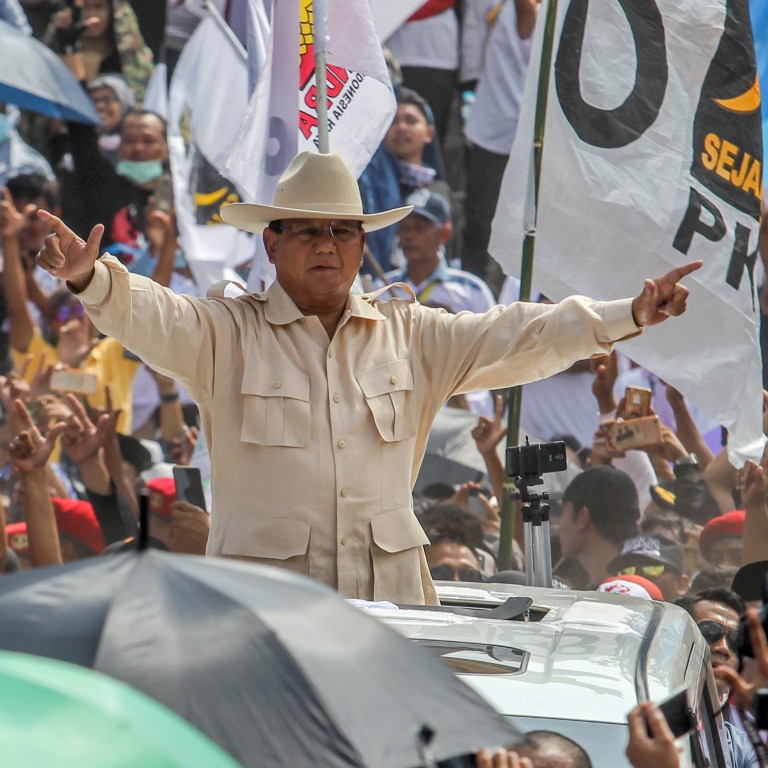
Indonesia elections: is Prabowo Subianto on the verge of a Mahathir Mohamad-style upset?
- Not long ago, few pollsters would have given Prabowo Subianto a chance of defeating incumbent President Joko Widodo
- But now the former special forces general is gaining momentum – and drawing inspiration from Malaysia’s 93-year-old leader
But try telling that to Risnawati, a 47-year-old food seller from West Jakarta who spent a recent Sunday morning inside the capital’s sprawling Gelora Bung Karno (GBK) stadium waiting for the former general to give a speech.
She was joined by hundreds of thousands of others, mostly dressed in trademark white clothes, who flocked to the city’s main sports venue to “whiten the GBK” – a campaign slogan that has become a rallying cry for the presidential hopeful’s legions of supporters.
“I would be very sad if Prabowo lost. I really hope for change,” said Risnawati, who had left her home after dawn prayers that day to “follow her heart” and join scores of her neighbours also attending the rally.
Exclusive: Indonesia election ‘not about religion’: Sandiaga Uno
“As a mother and a food seller I just want affordable prices for staple goods. Now, prices of basic necessities are rising before Ramadan, especially onions and tomatoes. When I buy them at the market I feel that they’re too expensive.”
Concerns over volatile food prices and promises of a nationwide retirement plan for owners of small and medium-sized enterprises are pushing some voters like Risnawati towards Prabowo.
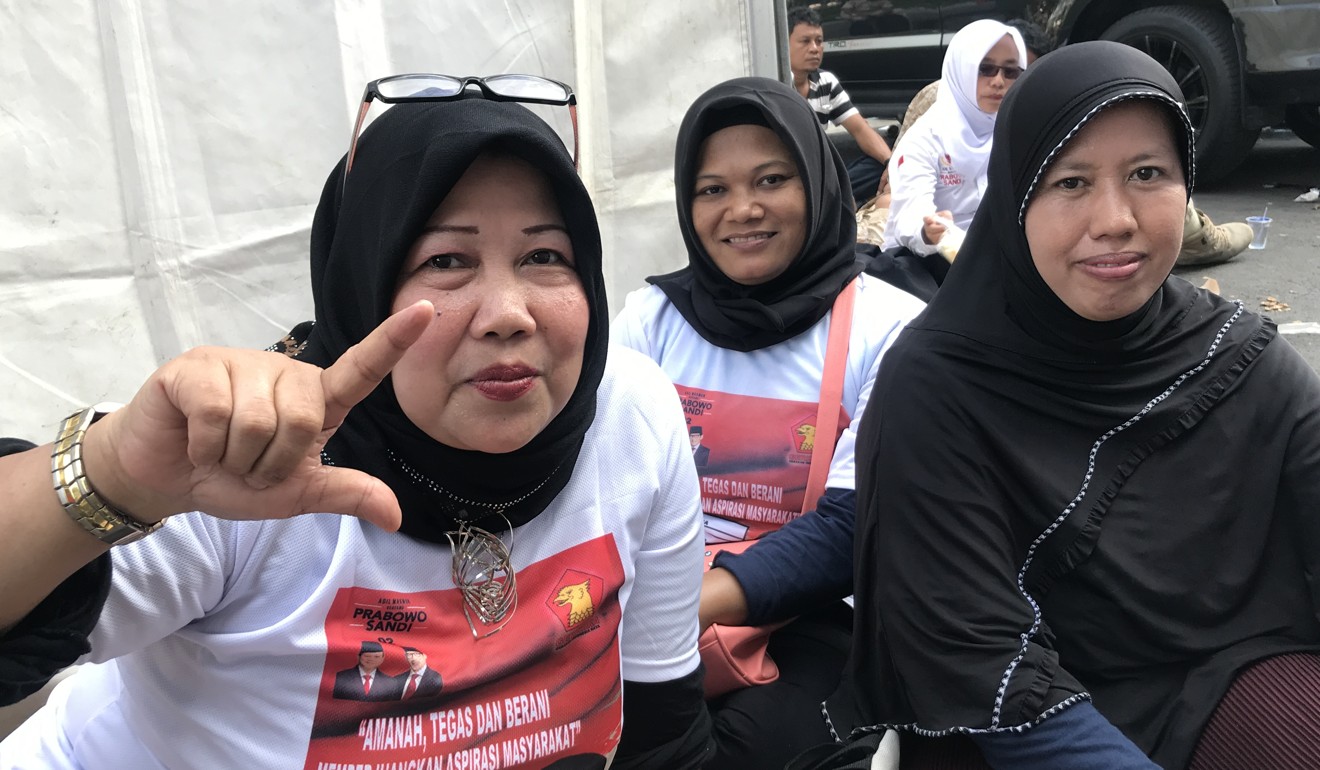
Rising unemployment is another worry.
“I graduated four years ago from vocational school and haven’t been able to land a job,” said 22-year-old Ria Anggraini, who was also at the rally.
“I heard that the president [Widodo] promises a pre-work card that would provide salaries to the unemployed like me, but I need to see the proof, I don’t want to hear another promise.”
Although not of the same generation as the youngest of voters, he seems more likely to attract the youth vote than Widodo’s choice of candidate for vice-president – 76-year-old conservative Muslim cleric Maruf Amin.
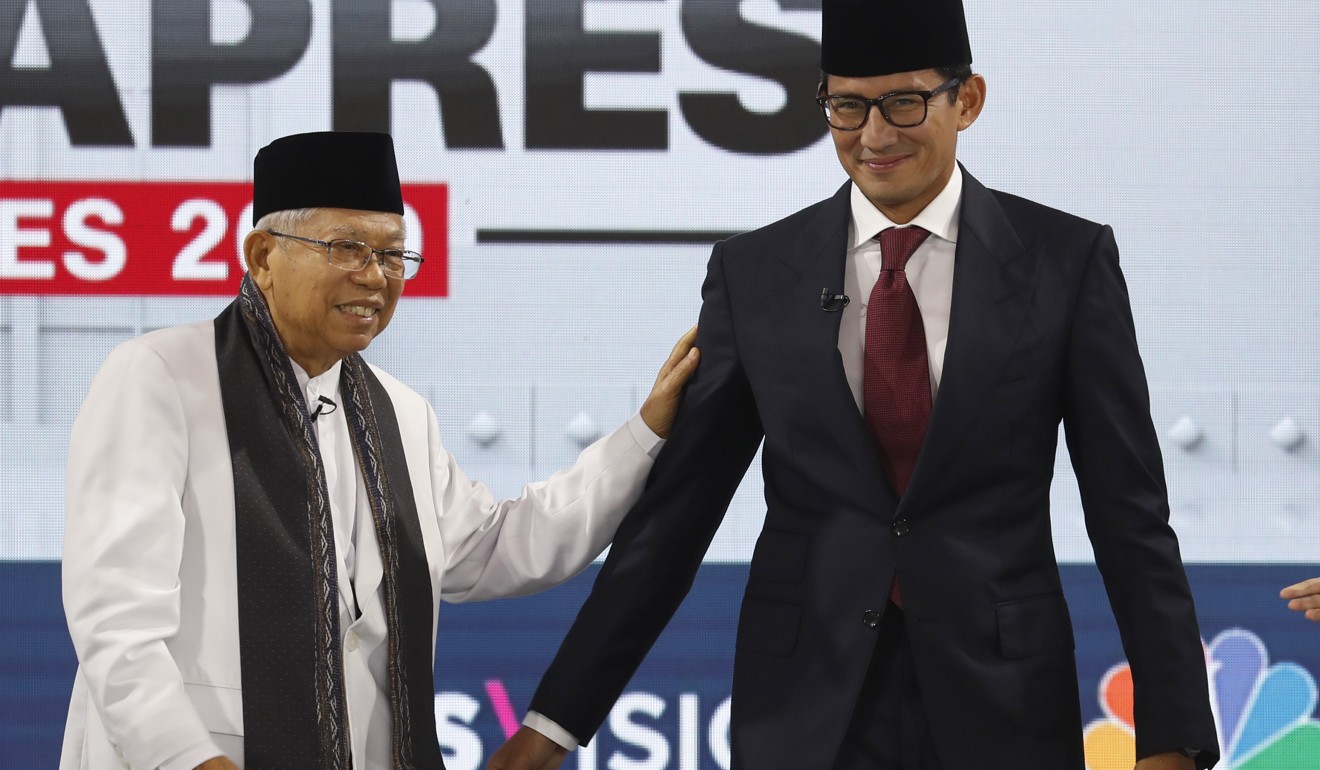
“Surveys show that millennials are favouring Prabowo over Jokowi because they think that Maruf Amin is too old, so his [leadership] prospects are not promising,” said Syamsuddin Harris, head of political research at the Indonesian Institute of Sciences.
At 67, Prabowo is hardly a spring chicken himself, though he does have a recent example from quite close to home of an elder statesman causing an electoral upset.
“He actually just wanted to retire, but he saw how his country was ravaged by corruption so he came down from the mountain. I also see that corruption has flourished in Indonesia, I’m very fed up about it.”
Prabowo’s human rights record a ‘five-yearly-issue’: Sandiaga Uno
On Monday, Prabowo’s camp published the results of their own survey showing his electability standing at 62 per cent, compared with Widodo’s 38 per cent. They can also point to the significant number of swing and undecided voters, which most surveys put at between 11 and 17 per cent.
So, even though the 20-point lead that many pollsters ascribe to Widodo is going to be hard to overcome, the camp is projecting confidence.
The survey and the enthusiastic responses from voters like Risnawati and Ria have convinced Prabowo that victory is well within grasp – so much so that he warned on Thursday there would be unrest if the election was “stolen” with massive cheating “going against the will of the people”.
In 2014, Prabowo also initially claimed victory. Widodo won the race then with nearly 71 million votes, 6.3 per cent more than the 62.5 million votes for Prabowo.
Could Hong Kong’s domestic workers sway the Indonesian election?
If the allegations – and further discovery – of vote stuffing snowball in the coming days, Widodo will come under more intense attack.
Under his watch, poverty has shrunk and the economy has grown – though last year’s headline rate of 5 per cent year-on-year growth was less than the 7 per cent he had promised.
Muhammad Qodari, executive director at Jakarta-based polling organisation Indo Barometer, said Widodo’s popularity was “very high in rural areas and among the lower-middle class, as his programmes tend to be populist and bring benefits to the people”.
“If you asked the people now about their main concerns, they would say unaffordable prices of staple goods and low employment. This shows that Jokowi has solved the problems with education and health care access,” he said.
Cautious of the economic nationalism evident in some of Prabowo’s campaign remarks, the business community also seems to be on Widodo’s side.
China’s belt and road: a surprise winner in Indonesian election?
“Jokowi has a clear track record and an outstanding [economic] team. We appreciate Jokowi’s infrastructure drive, which hasn’t upset our macroeconomy and GDP growth,” said Haryadi Sukamdani, chairman of the Indonesian Employers Association.
“I agree with Jokowi’s programme to increase the quality of human resources during his second term. China’s initial focus was also on how to increase its human capital, that eventually turned it into an economic powerhouse.”
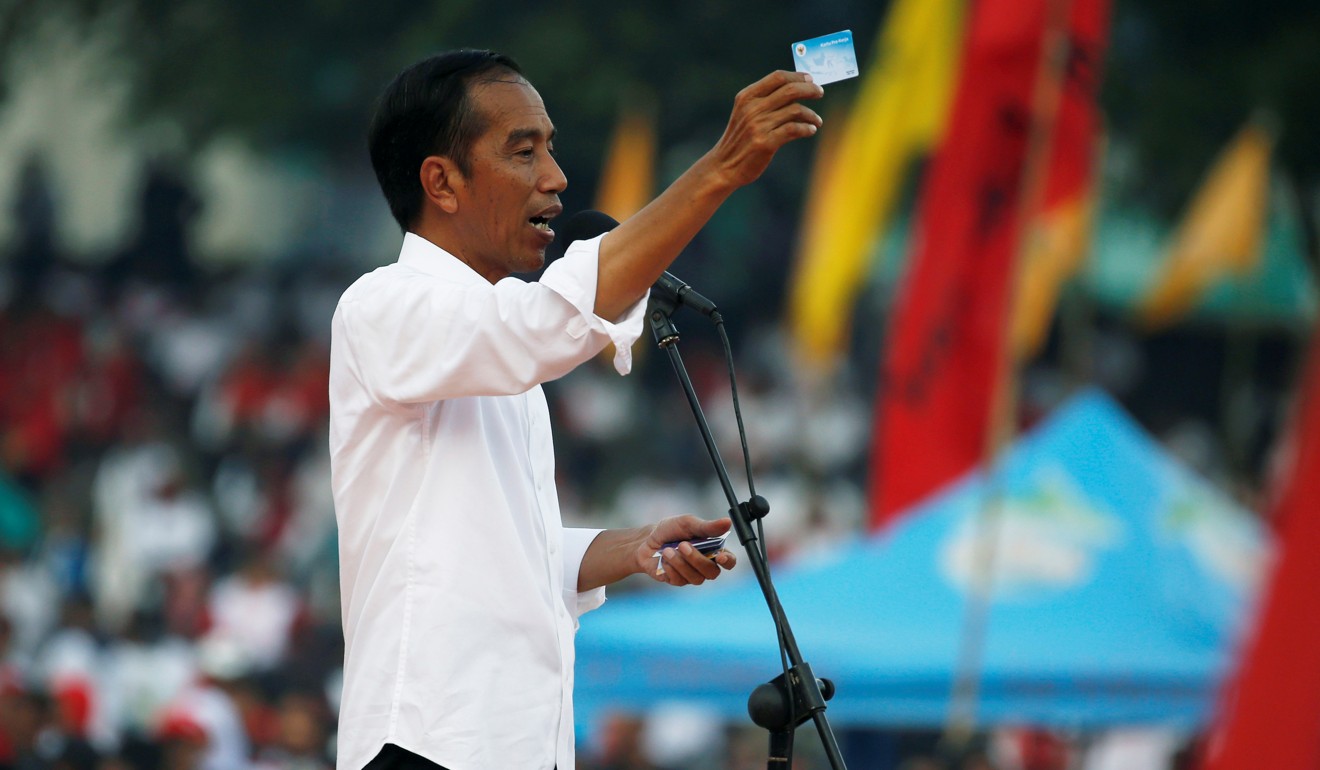
Widodo has also benefited from Indonesia’s election laws, which require presidential candidates to have the support of at least 20 per cent of the House of Representatives.
The coalition of parties backing the current president controls more than 60 per cent of seats, explaining why there are only two candidates in this year’s presidential race – the same two men who contested last time.
“The presidential nomination threshold has resulted in the polarisation of voters, as well as limiting the number of alternative candidates,” said Titi Anggraini, director of elections watchdog the Association for Elections and Democracy.
“We have a multiparty system, but for presidential elections we are forced to choose between the two candidates.”
Joko Widodo’s latest challenge may come from people refusing to vote
The result had been an increase in pragmatism and apathy, she said, with more people pledging to abstain or cast a blank vote – known locally as golput .
In the last presidential election, 29 per cent of voters did so, up from 27.91 per cent in 2009 and 20 per cent in 2004.
“The golput rate is actually declining for the legislative elections, but it’s increasing for presidential elections,” Anggraini said.
In the last election, Widodo struggled to win votes in key regions such as West Java, West Sumatra and Aceh. And there are indications that former supporters in these regions have now switched allegiances.
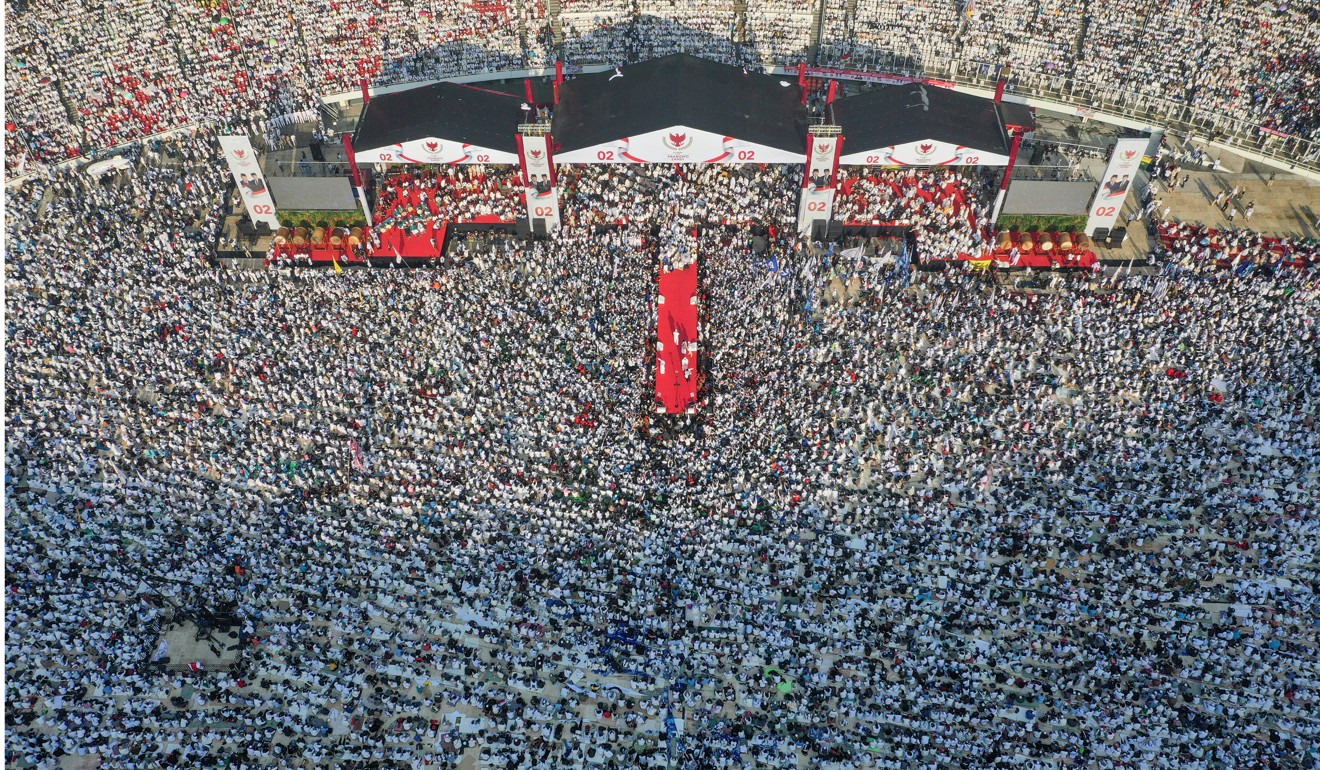
“I voted for Jokowi in 2014 but now I have decided to support Prabowo,” said Tezar Pahlevi, a 31-year-old honey farmer from Aceh.
“Jokowi’s four-and-a-half years of success are mostly based on infrastructure developments which caused land disputes. He also failed to lift agricultural commodity prices, which made our life more difficult.”
For Qodari, of Indo Barometer, the current president needs to do more to increase voter turnout, as this could prove crucial on polling day on April 17.
“In 2014, Jokowi lost in 10 provinces, including West Java, which delivered 4.6 million votes, higher than the 3.6 million total votes in the nine other provinces,” he said.
“I expect that abstaining voters will not be significant enough to upset Widodo’s win in the election, but if the golput rate reached 40per cent, I think Prabowo might win.”
Win or not, Prabowo’s presumptive claims of victory will pave the way for a long-drawn road to an final outcome. ■

